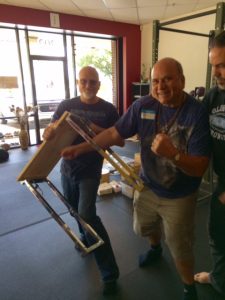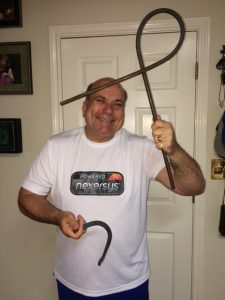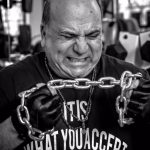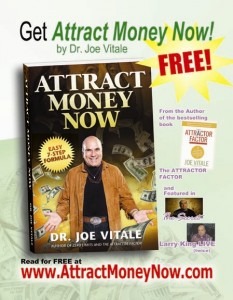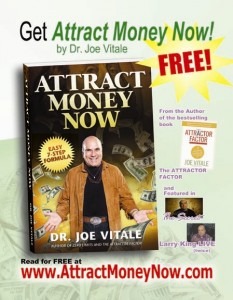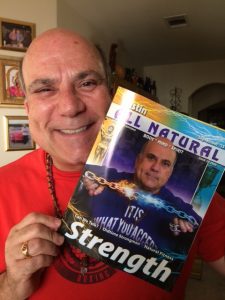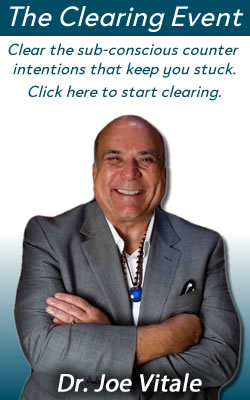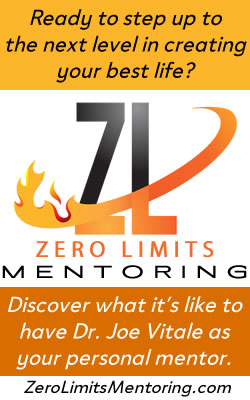Tag: joe vitale
Imprint Free
Moonshine is a barn owl.
But he doesn’t know it.
He thinks he’s human.
He was stolen from his nest when he was still in an egg. When he hatched, opened his eyes, and looked around, he saw a human. He was supposed to see his mother owl.
Owls “imprint” the first thing they see at birth. Because Moonshine saw a human upon birth, he thinks he is human. He can even parrot human language.
But he can never be released into the wild, because he doesn’t know he is really an owl. He has no survival skills.
You and I are a lot like that.
When we were born, we started to “imprint” the behavior we saw around us.
No doubt your parents weren’t enlightened. They had issues with money, relationships, and more.
You unconsciously “imprinted” their beliefs.
Today, as an adult, you wonder why you have issues with money or health or relationships.
You wonder where your programming came from.
The answer is in Moonshine the barn owl.
Like him, you were imprinted with beliefs.
It’s not your fault, any more than it’s Moonshine’s fault.
You simply “imprinted” what you saw after birth.
But you have an advantage over Moonshine.
He can’t change his imprint.
You can.
Because you have self awareness, and you have the ability to actually reprogram your mind, you can erase your imprint and break free.
I met Moonshine last year and saw him again this year, both times at the Miracles Coaching retreat at Robert Redford’s Sundance mountain resort in Utah, when Patti Richards of Great Basin Wildlife Rescue came to educate us about birds of prey.
This time she also brought an Eagle Owl, the largest owl in the world.
This Eagle Owl is gigantic.
It’s hard to comprehend his size without seeing him in person, especially sitting with a barn owl beside him.
He has no known predators, can lift about fifty pounds (!), and is essentially fearless.
Good thing he doesn’t live in Northern America, as he’d be flying off with our dogs, cats, and children.
Imagine it.
He’s fearless.
Where Moonshine thinks he is human and can’t survive in the wild, this Eagle Owl imprinted fearlessness from his Eagle Owl parents, and can essentially fly, hunt, thrive and survive – up to fifty years.
You may have been imprinted with limiting beliefs, but you can change them.
Moonshine can’t enroll in Miracles Coaching.
Or choose to read self help books, listen to positive messages, or recreate himself.
But you can.
Will you?
Ao Akua,
PS – Patti Richards of Great Basin Wildlife Rescue in Utah is doing great work. Last year I released an owl I named Mango. This year we released two hawks. Seeing the second, young adult hawk soar higher and higher into the Utah sky, high above the mountains, demonstrating what freedom is all about, brought tears to my eyes. I want you to have that kind of freedom, too.
Mind Bending Steel
If I handed you a horseshoe and said “Bend it,” what would you do?
Probably nothing, right?
Same thing if I offered you a metal bar.
You’d hold the cold steel and wouldn’t know where to begin.
Your mind wouldn’t have any idea how to start.
It would seem impossible.
But the other day I came home and handed Nerissa a bent horseshoe and a twisted metal bar.
“You bent these?” she asked in amazement.
“Yep,” I replied. “And I also drove a nail through a board with my hand.”
“How is that even possible?” she asked.
And that’s where I had an “aha” about how we can more easily and quickly change beliefs.
Let me explain…
I attended the Strongman University seminar with the legendary Dennis Rogers and strongman David Whitley. You may recall their names because I wrote about them on a previous blog post.
Both guys are powerfully strong, and prove it by ripping thick phone books, decks of playing cards, bending nails and spikes and steel bars and horseshoes, breaking out of chains, holding people high in the air with one hand, and more.
They come from a long history of strongmen (and women) who do feats of strength for a living.
I attended the event to find out their tricks of the trade.
Turns out, there aren’t any tricks.
These strongmen are actually doing what you see them do.
While there may be magic trick approaches to getting similar results, Dennis and David and the old school authentic strongmen don’t use tricks.
They are using intent, will power, knowledge of technique, and a tremendous amount of focused sheer strength.
I know because it took everything in my body and mind to bend a horseshoe.
My muscles ached, my breathing was hard, my face was flushed, my neck veins were popping, and I groaned and struggled as my entire body and mind were focused on bending that horseshoe.
And I did it, too.
But when I first held it, it seemed impossible.
After all, a horseshoe is hard steel and made for a horse.
It’s not designed to give.
How was I going to bend it?
But here’s what happened:
I saw David do it.
Then I saw a few other people in the event – including two petite but strong women – do it.
And then I knew it was possible for me, too.
In other words, seeing living proof of it being done convinced me – it changed my belief system – and I realized it was now possible for me, too.
This insight made me realize that when you want to change something in your life, you might need to read, see, or meet someone who has already done it.
Once your mind accepts the reality of change, it then becomes possible for you, too.
You still have to take action, of course.
The horseshoe will not bend by itself.
I have to pick it up.
I have to see it in my mind bending.
And I have to collect all the muscle and energy and focus possible within me and aim it at that horseshoe.
But because I know it can be done, I’m more inclined to give it my all.
And when the horseshoe bends, you feel like superman.
Same is true for all your goals.
Once you achieve one, the rest become doable.
You don’t have to pick up a horseshoe and bend it, but wouldn’t it be cool if you took on a daring challenge and completed it?
And if it’s a big challenge – like bending a horseshoe or steel bar was for me – then read about or watch a film about someone who already achieved the goal you want to achieve.
Their success will teach you and inspire you and let you know that what you want to do is possible.
And then, go do it.
Ao Akua,
PS – What if you try and fail? Truth is, I wasn’t able to do all the feats of strength that David and Dennis taught. I couldn’t rip a phone book, tear a deck of cards, or bend a metal spike. I tried so hard that my muscles still ache today. So, did I fail? Not at all. As long as I keep trying, and remind myself that it is possible for me to do, then I will succeed. The “failure” was simply feedback that my grip needs to be stronger. And that means my “failed” attempts were actually part of my training. Just trying to rip or tear or bend was building my muscle. You never fail as long as you keep moving forward.
Best Books Ever
A dear friend asked me to create a list of recommended current books to read. I loved doing it. He looked at that list and said he hadn’t read any of them, and had only heard of one of them. With that in mind, I thought you might like to see the list. Here you go…
Total Recall by Arnold Schwarzenegger. Incredibly terrific. It’s “Fantastic!”
http://www.amazon.com/Total-Recall-Unbelievably-True-Story/dp/1451662440/
The Walk by Philippe Petit. Riveting. Unique. Made me hyperventilate.
http://www.amazon.com/Walk-Philippe-Petit/dp/163450500X
I, Mammal by Loretta Breuning. Enlightening. Read all of her books.
http://www.amazon.com/Mammal-Brain-Links-Status-Happiness/dp/1941959008/
The Elements of Eloquence by Mark Forsyth. Fun, funny, flippant. It will spin your writing into a spell generator. (“Spell” as in “I’ll put a spell on you!”)
http://www.amazon.com/Elements-Eloquence-Secrets-Perfect-Phrase/dp/042527618X/
The Book of est by Luke Rhinehart. Hypnotic. Loved it so much I published it. 🙂
http://www.amazon.com/Book-Est-Luke-Rhinehart/dp/0557306159/
Muscle: Confessions of an Unlikely Bodybuilder by Samuel Wilson Fussell. Wise, well written and deeply revealing.
http://www.amazon.com/Muscle-Confessions-Samuel-Wilson-Fussell-ebook/dp/B00TGJJ12O/
Making the American Body by Jonathan Black. Entertaining.
http://www.amazon.com/Making-American-Body-Remarkable-Passions/dp/0803243707/
Mark Twain: Man in White by Michael Shelden. Love Twain.
http://www.amazon.com/Mark-Twain-Adventure-Hardcover-January/dp/B010EWNKVE?
The Shack by William Young. Novel.
http://www.amazon.com/Shack-William-P-Young/dp/0964729245/
Rejection Proof by Jia Jiang. Hilarious and empowering.
http://www.amazon.com/Rejection-Proof-Became-Invincible-Through/dp/080414138X/
The Power of Neuroplasticity by Shad Helmstetter. Simple yet beautiful.
http://www.amazon.com/Power-Neuroplasticity-Shad-Helmstetter-Ph-D/dp/1499794606/
Lincoln: Biography of a Writer by Fred Kaplan. Love Lincoln.
http://www.amazon.com/Lincoln-Biography-Writer-Fred-Kaplan/dp/0060773340/
Thomas Jefferson: Art of Power by Jon Meacham. Fascinating.
http://www.amazon.com/Thomas-Jefferson-Power-Jon-Meacham/dp/0812979486/
Bill Veeck by Paul Dickson. The Barnum of baseball.
http://www.amazon.com/Bill-Veeck-Baseballs-Greatest-Maverick/dp/0802778305/
Chronicles by Bob Dylan. Reads like a folk song with Dylan style.
http://www.amazon.com/Chronicles-Bob-Dylan/dp/0743244583/
The Most Contented Man by Joseph J. Vitale. My Dad. 🙂
http://www.amazon.com/Most-Contented-Man-Autobiography-Joseph/dp/1512287253/
Stuntman! By Hal Needham. Lively read.
http://www.amazon.com/Stuntman-Car-Crashing-Plane-Jumping-Bone-Breaking-Death-Defying/dp/0316078999/
The Einstein of Money by Joe Carlen. Insightful.
http://www.amazon.com/Einstein-Money-Timeless-Financial-Benjamin/dp/1616145579/
Not Impossible by Mick Ebeling. Inspiring.
http://www.amazon.com/Not-Impossible-Doing-What-Couldnt/dp/1476782806/
The Power of Impossible Thinking by Yoram and Cook. Life changing.
http://www.amazon.com/Power-Impossible-Thinking-Transform-Business/dp/0131877283/
The Spiritual Journey of Joseph L. Greenstein by Ed Spielman. Astonishing.
http://www.amazon.com/Spiritual-Journey-Joseph-L-Greenstein/dp/1885440308/
And any book by Joe Vitale... 🙂
Ao Akua,
PS – I love books. Feel free to leave a comment telling me about your own favorites.
Find a Calf, Lift It
The following is the cover story feature article in this month’s issue of Austin All Natural magazine, by yours truly:
“Let me make you a paper weight.”
It was Dennis Rogers speaking. Many consider him the world’s strongest man. Celebrities call on him for advice on performing and getting strong. He’s performed over 2,600 feats of strength shows. He’s a legend.
We met over lunch. He wanted to give me a gift, or rather make one for me.
He wrapped his hands in a thin leather protective covering, and then began to bend a wrench before my eyes. I couldn’t comprehend how he did it. I had felt the wrench beforehand and it was a genuine metal tool, heavy and solid. But it bent like it was warm butter.
By now the kitchen staff had seen the bent wrench and saw the small lunch crowd forming around Dennis and me.
“Would you like me to roll a frying pan for you?” Dennis asked the cook and staff. “It can be a souvenir you can hang in the kitchen.”
They all agreed, their eyes bugged out and waiting.
Dennis pulled out a frying pan, put his fingers over the edge, and began to slowly roll it like it was a tortilla. It was astonishing to see. It was surreal. Dennis was clearly focused, breathing hard, putting his life force into his efforts.
He handed the completely rolled up pan, now of no practical use, to the chef.
None of us could believe it.
I had seen strongmen and feats of strength before. When I was in Russia, a man billed as the world’s strongest man – I guess there can be more than one – bent a heavy nail before my eyes. He, like Dennis, used sheer power and intense focus to get it done.
I admired it. I could see applications in other areas of life. I wanted to know more.
The origin of strongman feats of strength goes back to prehistory, maybe even back to caveman picking up boulders and protecting their caves.
The first of the recorded characters was probably Milo of Croton, an ancient Greek wrestler, circa 558 B.C.
His training was simple: find a young calf, lift it.
Next day, find a heavier calf, lift it.
Next day, find a heavier calf or cow, lift it.
It was an early exercise routine today named progressive overload. But that’s the ancient Greeks for you. They didn’t name it. They just knew the process made them stronger.
But feats of strength were performed throughout history, right into the circus and on the vaudeville stage throughout the 1800s.
As time went on, strength displays were broken into categories, such as power lifting and bodybuilding.
I admire men and women who use intention and strength to accomplish something the rest of us might consider virtually impossible.
- Julie Havelka, a competitive female strength athlete, wrote Personal Best: How to Train for the Sport of Strongman. She reveals the intensity of mind and muscle needed to accomplish these feats. Lifting huge stones, tractor tires, or small horses isn’t uncommon.
- Eugen Sandow (1867-1925), considered the father of modern bodybuilding, began his career as a sideshow strongman. The list of colorful characters goes on, and is alive today in people like Dennis Rogers.
- Joe Holtum, in the 1800s, would catch a cannon ball in his bare hands. He lost a finger or two along the way, but always drew a crowd.
- And I once saw a clipping about Joe Vitale – yes, the same name as mine – a circus performer in New York City in the 1900s who lifted over 500 pounds – with his teeth.
Some of these early strongmen, most notably Joseph Greenstein, whose stage name was the Mighty Atom, also pursued strength as a means of mental and spiritual development.
Authentic strongman and strongwomen don’t use magic tricks to get their results. They want to impress themselves as well as you.
This is one reason I’m attending Dennis Rogers and Dave Whitley’s Oldetime Strongman University Training in Austin September 19-20. http://www.dennisrogers.net/oldetime-strongman-university-seminar/
I want to learn what it takes to be a modern walking Hercules, able to bend nails, wrenches, frying pans or your car keys, but doing it as a type of meditation. Using it to stretch myself into bigger possibility thinking.
Dennis told me, “The area of strength that David Whitley and I will be teaching is the artistic display of physical strength. I say this because you must certainly build your body, particularly your core and grip, but it also requires a creative mind and artful presentation.
“It is the art of the old vaudeville and Coney Island strength stars. Men like Eugen Sandow, Siegmund Brietbart, Warren Lincoln Travis, and ‘The Mighty Atom.’ “
According to author and strength historian David Willoughby, “It was Sandow who raised feats of strength out of the grunt-and groan category and made them spectacular and entertaining.”
But it’s not about the bent item, it’s about learning to use your mind and muscle to get results. That’s priceless anywhere.
David Whitley said, “It is the bodily expression of the mind’s power.”
And that’s why I trained with the “old school” bodybuilders, like multiple Olympia winner Frank Zane, who advised me, “Watch your thoughts. Most people let their mind talk themselves out of what their muscle can do. Push past the voice.”
And Steve Reeves, the legendary early bodybuilder who played Hercules in the original movie, said he would visualize his muscles growing as he worked them. Arnold does the same thing.
It’s mind over muscle.
Dennis Rogers once told me that most people give up in trying to bend a wrench right before the wrench is going to bend. “They let their minds talk themselves out of what they can achieve,” he explained.
David Whitley said, “We tend to think of the physical first, but being strong is something that goes beyond the physical performance of feats and encompasses the entire being. It is a means of discovering, unifying and expressing the True Self.
“The essence of being an old-time strong man in my opinion is recognizing and acknowledging the infinite potential of the human mind. The ability to bend steel, rip decks of cards, etc., has its roots in the same place as every great invention or work of art we have ever seen: The Imagination.”
You can see how relevant this is to all aspects of life, not just in the gym or on stage. It’s about using your mind and body to achieve your intentions. It’s about training in a way to exceed your own “personal best” and proving to yourself and others that virtually nothing is impossible.
Now, stand back, as I’m going to break that chain around my neck on the cover of the magazine…
Ao Akua
Joe
PS – If you are in the Austin, Texas area, you can find the current issue of Austin All Natural at places like Central Market, Whole Foods, and leading edge book stores and yoga studios. You can read it online right here.
Loving Wayne Dyer
The passing this week of self-help author Wayne Dyer has shaken and saddened the world.
He influenced millions, inspiring them, educating them, being a light for the road ahead.
He wrote forty books, recorded numerous programs, and spoke to millions.
He changed my life, too, way back in the early 1980s.
I borrowed his books and cassettes from the public library. I watched him on television.
He was brilliant in articulating principles I had not heard before.
He was one of the first great living teachers in my life.
I still remember him talking about the difference in scolding a child, and scolding a child’s behavior.
They were two different things.
The child was never wrong, but their behavior might be.
The first audio program I ever heard of his was How to Be A No-Limit Person from Nightingale-Conant.
That was probably around 1980. I was still struggling but deeply searching, too.
Wayne’s program helped me rethink my own life, including my beliefs and behaviors.
He helped awaken me to inner powers and renewed optimism.
He helped get me through the dark night of my soul.
I also learned book marketing from Wayne.
I remember the story of him quitting his job in 1976, loading a station wagon with his first book (Your Erroneous Zones) and traveling the country for an entire year, going on every radio or TV show that would have him as a guest.
It was old school door-to-door marketing.
He was relentless and persistent in sharing his message to the world.
When he returned home, his neighbors said, “Hey, while you were on vacation, your book became a bestseller.”
Obviously, he made it one.
I never met Wayne in any formal way but we spoke at the same event for Hay House in Austin a couple of years ago, and I saw him once years beforehand.
“The next time you are contemplating a decision in which you are debating whether or not to take charge of yourself, to make your own choice, ask yourself an important question, ‘How long am I going to be dead?’ With that eternal perspective, you can now make your own choice and leave the worrying, the fears, the question of whether you can afford it and the guilt to those who are going to be alive forever.” – Wayne Dyer
We were walking along the beach in Maui, going in different directions, and I said hi to him.
He paused long enough to acknowledge me, but I kept walking.
He was with a friend and I was focused on my walk.
I’m certain he would have stopped and chatted, as I sensed his humbleness, serenity and friendliness.
But the moment passed.
And now Wayne Dyer, age 75, has passed.
I regret that I didn’t stop my stroll long enough to share a few words, and to thank him in person for influencing me, too.
The world will miss Wayne Dyer, but they will never forget him.
His contributions will live forever.
As will our love for him.
Thank you, Wayne.
You did well.
Ao Akua,
Joe
PS – A news report of the passing of Wayne Dyer is here: http://www.nbcnews.com/news/us-news/self-help-pioneer-dr-wayne-dyer-dies-75-n418556








